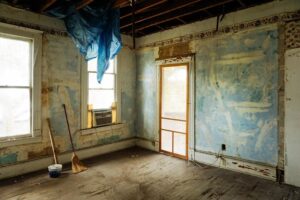
Flipping houses can be an effective method for seniors who want to invest in real estate. Essentially, flipping a house means finding a distressed property, renovating it, and selling it. When all goes well, you can make a healthy profit. But that’s assuming you approach the opportunity with a plan and make the right decisions.
Too many investors purchase the wrong property, fail to make the necessary upgrades, or make other mistakes that leave them financially compromised. That’s why David Steele & Associates has broken down the process to help you prepare for your next real estate investment!
Write Out a Plan
When getting into house flipping, you are essentially starting a business. And it’s crucial to view it that way so that you can position yourself for success. Your first step will be to write a business plan and a budget. Your business plan will help you stay on track with your goals and your budget will help you avoid spending unnecessary money and compromising your chances of making a profit.
The good news is that your business plan can be pretty simple. It basically needs to outline your mission, project scope, timeline, and the strategies you will implement to achieve your goals. And having a budget in place will prevent you from purchasing a property that you later realize you can’t afford to renovate, among other mishaps. You can modify your business plan and budget as you gain more experience as an investor.
Establishing a budget will require you to determine precisely how much your entire project will cost. This means factoring in the purchase price of the house and any other associated expenses (e.g., labor, materials, advisory services, etc.). And you don’t want to begin a house-flipping project without having a rigid timeline in place. You must ensure that you allow yourself plenty of time for repairs and renovations while also challenging yourself to stay active and progress toward your goals each day.
Assess Your Finances
No matter the size of the property and the renovations necessary, flipping a house always requires you to invest money to some degree. As such, you must make sure your finances are in order before getting too deep into the process.
Ideally, you will arrange to finance well before you even make an offer on a house because you don’t want to discover an incredible deal only to realize you don’t have the funds to capitalize on it. If you are new to house fishing, take time to research the various financing options so that you can compare the pros and cons of each and make an intelligent decision.
If you don’t have a lot of cash to work with, you can still flip houses. In fact, you can flip houses without paying any down payment. Explore home equity loans, hard money loans, private money loans, business lines of credit, and other financing opportunities to see if any of them will accommodate your needs without putting you in a dire financial situation.
Interest rates and other loan requirements are crucial when it comes to choosing a loan. So make sure you understand the terms before committing to any specific lender or loan. And look into alternatives such as partnering with other investors, wholesaling, and seller financing.
Identify the Right Property
Once you have your plan and finances in order, it’s time to look for the right property to flip. And when doing that, you must know what you’re looking for. Many first-time real estate investors go for the first cheap house they can find. But it is critical to understand that not every property is a good flipping opportunity.
First, consider the location of any property you are interested in. Keep in mind the features and characteristics important to homebuyers, such as proximity to schools, hospitals, restaurants, and other essential businesses. Families also look for houses in neighborhoods with low crime rates and good infrastructure.
Market value is another consideration. Property must be priced below market value to make sense for house flipping. Securing a short sale or foreclosure of distressed property is often an excellent opportunity to invest less up front, leaving you more money to make renovations. Look into real estate comps to determine if a house is below market value.
Moreover, any house you consider flipping must be structurally sound. This is especially important if you are looking to purchase an older house, which is more likely to have issues with the roof, foundation, walls, or other structural components. These types of issues are expensive to fix before the house is ready to sell.
Ideally, you will find a property that requires minor inexpensive repairs and updates so that you can maximize your profit. You might benefit from bringing in a home inspector to help you estimate how much it would cost to remodel or renovate the property.
Determine the Necessary Renovations
Renovations are a crucial part of flipping houses. One of the most important things about renovating an investment property is that, while you want quality workmanship you also need to operate on a tight schedule. You will start paying for taxes, utilities, insurance, and other expenses on the property as soon as you purchase it, and the longer the renovations take, the longer you pay those costs before you can start attracting potential buyers.
The idea is to complete renovations, sell the property, and pay off the loan as quickly as possible. Therefore, you will need to find experienced contractors who can work quickly without cutting corners. And you will want to prioritize cost-effective upgrades that can boost value such as replacing the doors, repainting the interior and exterior, replacing cabinets, etc.
Furthermore, remember that the kitchen is one of the most important rooms of a home to buyers. One kitchen upgrade worth considering is a rangehood. These appliances are positioned over the stove to keep odors, smoke, and grease from compromising the air quality in your kitchen and home.
Call on Professionals
Finally, don’t try to go at your first house-flipping endeavor alone. When you consider all the work involved, investing upfront for professional services can prove worthwhile. Make sure you have a reputable contractor you can call on for renovations and repairs. Interview several real estate agents to find someone with experience in the area who can help you find a property and negotiate the sale. And if you have a team to help you with renovations, you can use a payroll calculator to keep everything up to date.
If you want to try your hand at real estate investing, flipping houses can serve as an excellent introduction. Just make sure you come at the process with a strategy and make wise decisions along the way. The information and advice above can help you get started, but keep learning as much as you can about house flipping to position yourself for success!
David Steele & Associates is dedicated to serving the Winder, GA and Barrow County community with integrity and professionalism. Call 770-867-0055.
